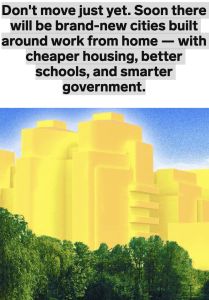
Don't Move Just Yet
Soon there will be brand-new cities built around work from home – with cheaper housing, better schools, and smarter government.
Read or listen offline
Recommendation
With work from home becoming more prevalent in the United States, economist Matthew E. Kahn proposes planned communities he dubs “Remotevilles.” These brand-new, compact towns would rise on the fringes of existing cities, but unlike suburbs, they would encourage civic engagement. People there would spend less money for homes, less time commuting, and more time enjoying parks, volunteer gigs and walkable spaces. Kahn believes his Remotevilles could revitalize smaller, struggling cities such as Baltimore, Maryland and draw people from places vulnerable to climate change. What might become of existing, sprawling suburbs? Kahn doesn’t say.
Take-Aways
About the Author
Matthew E. Kahn, Provost Professor of Economics at the University of Southern California, is the business director of the 21st Century Cities Initiative at Johns Hopkins University. His books include Going Remote: How the Flexible Work Economy Can Improve Our Lives and Our Cities and Adapting to Climate Change: Markets and the Management of an Uncertain Future. He co-wrote Unlocking the Potential of Post-Industrial Cities with Mac McComas.


















Comment on this summary or Start Discussion